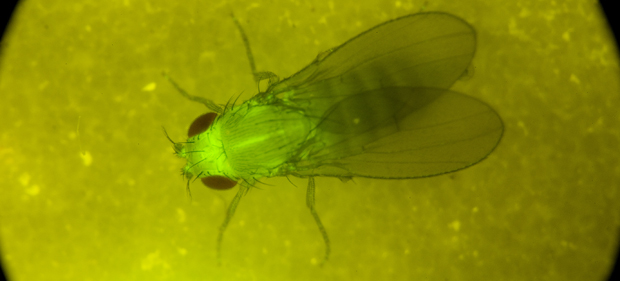Sprout Grants encourage innovation, entrepreneurship
Provost’s office funds disease research, clean energy tools and an education app
 Photo/Mike Lovett
Photo/Mike Lovett Professor Paul Garrity and post-doctoral fellow Lina Ni were awarded $3,000 to develop a smart phone app for fly labs
The winners of the 2014 Brandeis Virtual Incubator Sprout Grant Program aren’t afraid of a challenge. These entrepreneurial students, post-docs and faculty are tackling epilepsy, cancer and clean energy, improving genetic engineering and the treatment of diabetes and making science education more accessible and environmentally friendly.
Six winning teams will share $50,000 in funding to support the research and development of their technologies.
Inaugurated four years ago by the provost’s office, the competitive program promotes entrepreneurship in science and technology, and is open to Brandeis students, post-doctoral fellows, faculty and staff. A panel of judges from industry and corporate research selects the winners.
Graduate students Marissa Kuzirian and Aram Raissi led professor Suzanne Paradis’ lab to win $11,500 to develop a novel therapy to treat epileptic seizures. Unlike current drugs on the market, their approach aims to treat the underlying causes of seizures, not just symptoms.
“The Sprout grant will allow us to take a critical next step in our research program,” Paradis says. “Funding from the Sprout program enables us to test our ambitious hypothesis, which we hope will lead to further funding from more traditional granting agencies and possibly, interest from the biotechnology or pharmaceutical industries.”
Professor Dorothee Kern and post-doctoral fellows Adelajda Zorba and Ming-Feng Tsai received $10,000 for a method to discover a new class of anti-cancer drugs.
Assistant professor Timothy Street and Matthew O’Leary ’17 received $10,000 to develop a plan that could improve the manufacture of insulin to treat more than 350 million people with type 2 diabetes.
Deirdra Evers-McGregor, a graduate student in professor Christine Thomas’ lab, led her team to an $8,500 prize to create a catalyst to produce more economical and environmentally friendly commodity chemicals. The team includes post-doctoral fellow Seth Marquard, graduate student Katie Gramigna and Olivia Yue Yu ’16.
Professor Nelson Lau, research technician Jenny Klein, graduate student Sally Demirdjian and Connor Murphy ’14 were awarded $7,000 for a plan to improve a genome modification system.
Lastly, professor Paul Garrity and post-doctoral fellow Lina Ni were awarded $3,000 to develop a smart phone application to help students learn about fly genetics.
Along with Rebecca Menapace, associate provost and executive director of the Office of Technology Licensing at Brandeis, the panel of judges included Ann DeWitt, senior director of investments, Sanofi-Genzyme BioVentures; Eric Furfine, president of R&D, ElevenBio; Tom Ittelson, Mercury Group; Irena Ivanovska, program manager, Celdara Medical; and Stacie Weninger, executive director of Fidelity Biosciences Research Initiative.
Categories: Business, Research, Science and Technology





